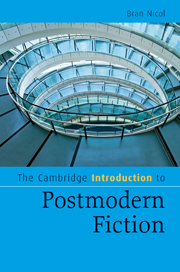Book contents
- Frontmatter
- Contents
- Acknowledgements
- Preface: reading postmodern fiction
- Introduction: postmodernism and postmodernity
- Chapter 1 Postmodern fiction: theory and practice
- Chapter 2 Early postmodern fiction: Beckett, Borges, and Burroughs
- Chapter 3 US metafiction: Coover, Barth, Nabokov, Vonnegut, Pynchon
- Chapter 4 The postmodern historical novel: Fowles, Barnes, Swift
- Chapter 5 Postmodern-postcolonial fiction
- Chapter 6 Postmodern fiction by women: Carter, Atwood, Acker
- Chapter 7 Two postmodern genres: cyberpunk and ‘metaphysical’ detective fiction
- Chapter 8 Fiction of the ‘postmodern condition’: Ballard, DeLillo, Ellis
- References
- Index
- Cambridge Introduction to …
Chapter 6 - Postmodern fiction by women: Carter, Atwood, Acker
Published online by Cambridge University Press: 05 June 2012
- Frontmatter
- Contents
- Acknowledgements
- Preface: reading postmodern fiction
- Introduction: postmodernism and postmodernity
- Chapter 1 Postmodern fiction: theory and practice
- Chapter 2 Early postmodern fiction: Beckett, Borges, and Burroughs
- Chapter 3 US metafiction: Coover, Barth, Nabokov, Vonnegut, Pynchon
- Chapter 4 The postmodern historical novel: Fowles, Barnes, Swift
- Chapter 5 Postmodern-postcolonial fiction
- Chapter 6 Postmodern fiction by women: Carter, Atwood, Acker
- Chapter 7 Two postmodern genres: cyberpunk and ‘metaphysical’ detective fiction
- Chapter 8 Fiction of the ‘postmodern condition’: Ballard, DeLillo, Ellis
- References
- Index
- Cambridge Introduction to …
Summary
Gender is an especially problematic issue when it comes to postmodern theory. A cursory glance at the roster of prominent names in the postmodern debate might lead to an obvious question: where have all the women gone? Indeed a version of this question informs part of the argument of two important contributions to the debate at its highpoint in the 1980s, Craig Owens's ‘The Discourse of Others: Feminists and Postmodernism’ (Owens, 1983) and Andreas Huyssen's 1984 essay, ‘Mapping the Postmodern’ (Huyssen, 2002). Their assumption is that feminism ought to find something of value in postmodernism, for it is about challenging authority and asserting difference.
These discussions by male theorists did serve to provoke many feminist theorists into the debate. Sandra Harding, for example, protested that feminism can only go so far in throwing out Enlightenment ideals (Enlightenment assumptions and prejudices are another matter), for, like Marxism, it is by definition committed to some of these, such as emancipation (Harding, 1990, 99). Sabina Lovibond took this argument further by identifying in the championing of postmodernist theoretical principles by male theorists ‘a collective fantasy of masculinist agency or identity’, one exposed by Owens's and Huyssen's assumption that it is humiliating to be ‘caught out’ – as they imply feminists are – ‘longing for a world of human subjects sufficiently “centred” to speak to and understand one another’ (Lovibond, 1989, 19).
- Type
- Chapter
- Information
- The Cambridge Introduction to Postmodern Fiction , pp. 140 - 163Publisher: Cambridge University PressPrint publication year: 2009



